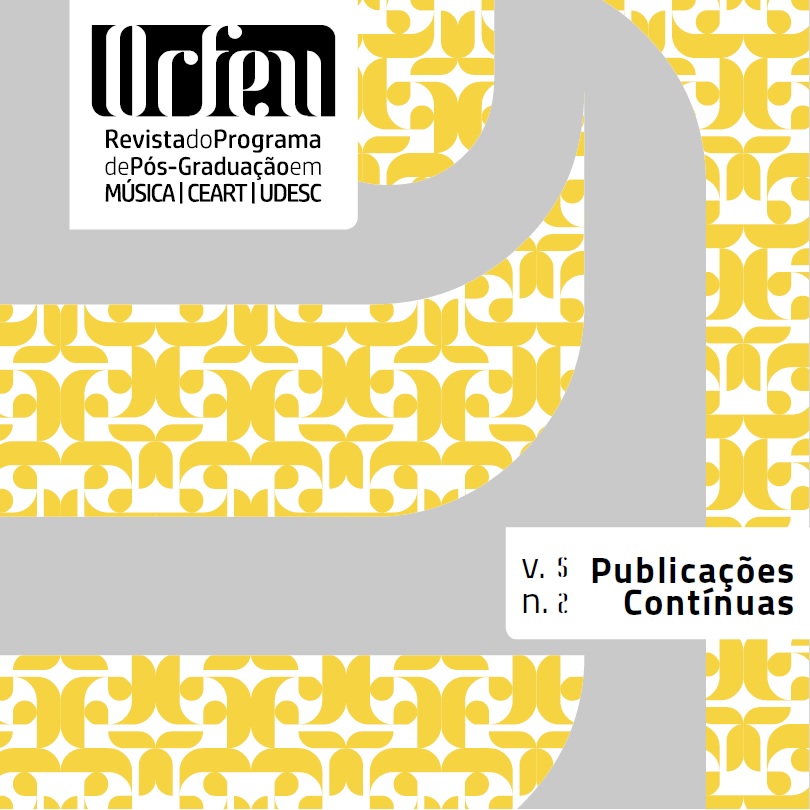Sacred music in Leopold I’s reign
DOI:
https://doi.org/10.5965/2525530405022020e0014Keywords:
Sacred music, Counter Reformation, Leopold I, Vienna, AustriaAbstract
When Leopoldo I was crowned emperor of the Holy Roman Empire in 1658, most of Europe was still in the process of economic recovery due to the so-called “general crisis of the 17th century”. Therefore, Leopoldo and the other members of the House of Habsburg were tasked with the reorganization and solidification of absolutism in the Austrian domains. To this end, the emperor found in sacred music an effective tool for convincing, advertising and displaying imperial power. This article aims to show the role of musical productions linked to the activities of the Counter-Reformation in Leopoldo I's reign. Initially, will be examined Leopoldo's religious education, as well as his particular interest in music and composition. There follows a discussion about the influence of the widowed empress Leonora de Gonzaga-Nevers (Leopoldo I's stepmother) in the development of Austrian music, mainly in relation to her participation in the establishment of the sepulcro in Vienna.
Downloads
References
BENNETT, Lawrence. The Italian Cantata in Vienna: Entertainment in the Age of Absolutism. Indiana: Indiana University Press, 2013.
BIRELEY, Robert. The Counter-Reformation prince: anti-Machiavellianism or Catholic statecraft in early modern Europe. Chapel Hill: The University of North Carolina Press, 1990.
CORETH, Anna. Pietas Austriaca. Indiana: Purdue University Press, 2004.
DEISINGER, Marko. Eleonora II und die Gründung ihrer Hofkapelle; Ein Beitrag zur Geschichte des kulturellen Lebens am Wiener Kaiserhof. Frühneuzeit-Info, v. 18, p. 45-, 2007.
DEISINGER, Marko. The Music Chapel of Empress Eleonora II. Source-related Difficulties in Researching the History of an Italian-dominated Institution in Vienna (1657-1686). Athens Journal of Humanities & Arts, v. 3, Issue 3, p. 171-180, 2016.
FELLERER, Karl Gustav. The history of catholic church music. Trad. F. A. Brunner. Minesota: Helicon Press, 1961.
FIEDLER, Joseph von (ed.). Die Relationen der Botschafter Venedigs über Deutschland und Österreich im siebzehnten Jahrhundert/2: K. Leopold I. Viena: Kaiserlich-Königliche Hof- und Staatsdruckeri, 1867.
HILL, John Walter. Baroque music: music in Western Europe, 1580-1750 (The Norton Introduction to Music History). New York: W. W. Norton & Company, 2005.
HOLLER, Marcos. Os jesuítas e a música no Brasil colonial. Campinas: Ed. Unicamp, 2010.
HUFTON, Olwen. Every tub on its own bottom: funding a Jesuit College in early modern Europe. In: O’MALLEY, J.; BAYLEY, G.; HARRIS, S.; KENNEDY, T. (org.). The Jesuits II: Cultures, Sciences, and the Arts, 1540-1773. Toronto: University of Toronto Press, 2006. p. 5-23.
INGRAO, Charles W. The Habsburg Monarchy, 1618–1815 (New Approaches to European History). Cambridge: Cambridge University Press, 2005. Edição Kindle.
KENDRICK, L. Robert. Fruits of the cross: Passiontide music theater in Habsburg Vienna. California: University of California Press, 2019.
POTTER, Pamela M. A mais alemã das artes: musicologia e sociedade da República de Weimar ao fim da era nazista. Trad. R. Patriota. São Paulo: Perspectiva, 2015.
SCHNITZER-BECKER, Rotraut. Dizionario Biografico degli Italiani. Roma: Treccani, 1993. v. 42. Disponível em: https://www.treccani.it/enciclopedia/eleonora-gonzaga-nevers-imperatrice_(Dizionario-Biografico). Acesso em: 20 jan. 2020.
SOMERSET, H. V. F. The Habsburg Emperors as Musicians. Music & Letters, Oxford University Press, v. 30, n. 3, p. 204-215, 1949.
WEAVER, Andrew. Music in the Service of Counter-Reformation Politics: The Immaculate Conception at the Habsburg Court of Ferdinand III (1637-13657). Music & Letters, v. 87, n. 3, p. 361-378, 2006.
WEAVER, Andrew. Sacred Music as Public Image for Holy Roman Emperor Ferdinand III Andrew H. Weaver Representing the Counter-Reformation Monarch at the End of the Thirty Years’ War. New York: Routledge, 2012.
WHITE, Harry. Johann Joseph Fux and the Musical Discourse of Servitude. In: ERHARDT, T. (org.). Sakralmusik im Habsburgerreich 1570-1770. Viena: Österreichische Akademie der Wissenschaften, 2016.
Downloads
Published
How to Cite
Issue
Section
License
Copyright (c) 2020 ORFEU

This work is licensed under a Creative Commons Attribution 4.0 International License.
Authors who submit their manuscripts to be published in this journal agree to the following terms:
1. Authors retain the copyright and grant to the journal the right of first publication, whilst simultaneously permitting their work to be licensed under the Creative Commons License Attribution, which allows the sharing of work with recognition of the authorship and initial publication in this journal.
2. Contributions in this journal are open access; this means they are based in free use, and non-commercial applications.






